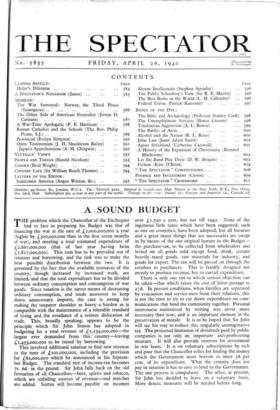A SOUND BUDGET
ir HE problem which the Chancellor of the Exchequer had to face in preparing his Budget was that of financing the war at the rate of £2,000,000,000 a year (higher by £500,000,000 than in the first seven months of war), and meeting a total estimated expenditure of L2,667,000,000 (that of last year having been L1,817,000,000). This sum has to be provided out of taxation and borrowing, and the task was to make the best possible distribution between the two. It is governed by the fact that the available resources of the country, though increased by increased work, are limited, and that the total expenditure has to be divided between ordinary consumption and consumption of war goods. Since taxation is the surest means of decreasing ordinary consumption, and tends moreover to keep down unnecessary imports, the case is strong for making the taxpayer shoulder as heavy a burden as is compatible with the maintenance of a tolerable standard of living and the avoidance of a serious dislocation of trade. This, broadly speaking, appears to be the principle which Sir John Simon has adopted in budgeting for a total revenue of £1,234,000,000—the largest ever demanded from this country—leaving £1,433,000,000 to be raised by borrowing.
This involved additional taxation to find new revenue to the tune of £ ca,000,000, including the provision for k62,000,000 which he announced in his Septem- ber Budget. The standard rate of income-tax becomes 7s. 6d. in the pound. Sir John falls back on the old favourites of all Chancellors—beer, spirits and tobacco, which are unfailing sources of revenue—and matches are added. Surtax will become payable on incomes over £x,soo a year, but not till 1942. None of the ingenious little taxes which have been suggested, such as one on cosmetics, have been adopted, but all luxuries and a great many things that are necessaries are swept in by means of the one original feature in the Budget— the purchase-tax, to be collected from wholesalers and levied on all goods sold except food, drink, certain heavily taxed goods, raw materials for industry, and goods for export. The tax will be passed on through the retailers to purchasers. This is frankly designed not merely to produce revenue, but to curtail expenditure.
There is only one tax to which serious objection can be taken—that which raises the cost of letter postage to 21d. In present conditions, when families are separated by evacuation and service-men from their relations, this is not the time to try to cut down expenditure on com- munications that bind the community together. Personal intercourse maintained by writing was never more necessary than now, and is an important element in the preservation of morale. It is to be hoped that Sir John will see his way to reduce this singularly unimaginative tax. The projected limitation of dividends paid by public companies is not only an important anti-profiteering measure. It will also provide reserves for investment in war loans. It is on voluntary subscriptions by rich and poor that the Chancellor relies for finding the money which the Government must borrow to meet 58 per cent, of its expenditure. What the country does not pay in taxation it has to save to lend to the Government. The one process is compulsory. The other, at present, Sir John has decided to leave on a voluntary basis. More drastic measures will be needed before long.


































